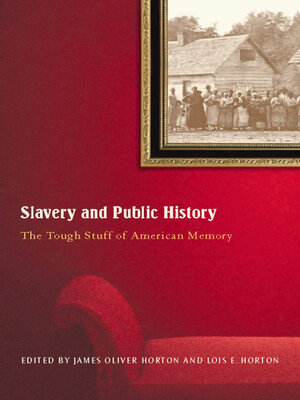
Sign up to save your library
With an OverDrive account, you can save your favorite libraries for at-a-glance information about availability. Find out more about OverDrive accounts.
Find this title in Libby, the library reading app by OverDrive.



Search for a digital library with this title
Title found at these libraries:
| Loading... |
“A fascinating collection of essays” by eminent historians exploring how we teach, remember, and confront the history and legacy of American slavery (Booklist Online).
In recent years, the culture wars have called into question the way America’s history of slavery is depicted in books, films, television programs, historical sites, and museums. In the first attempt to examine the historiography of slavery, this unique collection of essays looks at recent controversies that have played out in the public arena, with contributions by such noted historians as Ira Berlin, David W. Blight, and Gary B. Nash.
From the cancellation of the Library of Congress’s “Back of the Big House” slavery exhibit at the request of the institution’s African American employees, who found the visual images of slavery too distressing, to the public reaction to DNA findings confirming Thomas Jefferson’s relationship with his slave Sally Hemings, Slavery and Public History takes on contemporary reactions to the fundamental contradiction of American history—the existence of slavery in a country dedicated to freedom—and offers a bracing analysis of how Americans choose to remember the past, and how those choices influence our politics and culture.
“Americans seem perpetually surprised by slavery—its extent (North as well as South), its span (over half of our four centuries of Anglo settlement), and its continuing influence. The wide-ranging yet connected essays in [this book] will help us all to remember and understand.” —James W. Loewen, author of Sundown Towns
In recent years, the culture wars have called into question the way America’s history of slavery is depicted in books, films, television programs, historical sites, and museums. In the first attempt to examine the historiography of slavery, this unique collection of essays looks at recent controversies that have played out in the public arena, with contributions by such noted historians as Ira Berlin, David W. Blight, and Gary B. Nash.
From the cancellation of the Library of Congress’s “Back of the Big House” slavery exhibit at the request of the institution’s African American employees, who found the visual images of slavery too distressing, to the public reaction to DNA findings confirming Thomas Jefferson’s relationship with his slave Sally Hemings, Slavery and Public History takes on contemporary reactions to the fundamental contradiction of American history—the existence of slavery in a country dedicated to freedom—and offers a bracing analysis of how Americans choose to remember the past, and how those choices influence our politics and culture.
“Americans seem perpetually surprised by slavery—its extent (North as well as South), its span (over half of our four centuries of Anglo settlement), and its continuing influence. The wide-ranging yet connected essays in [this book] will help us all to remember and understand.” —James W. Loewen, author of Sundown Towns






